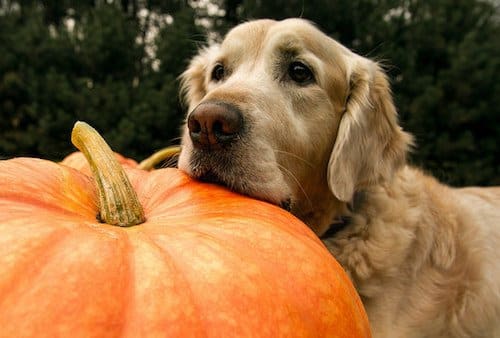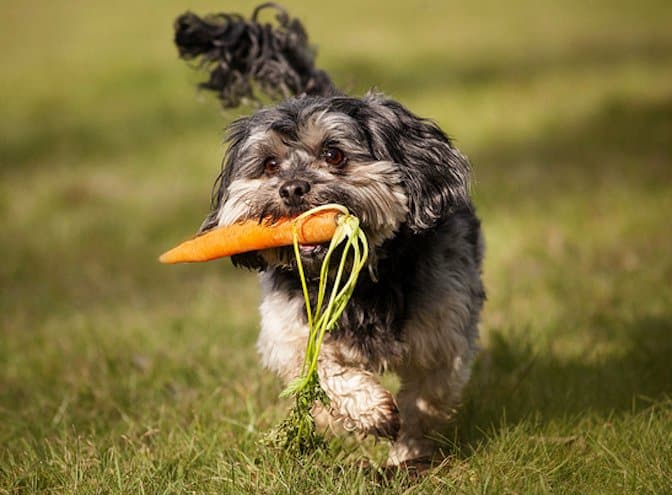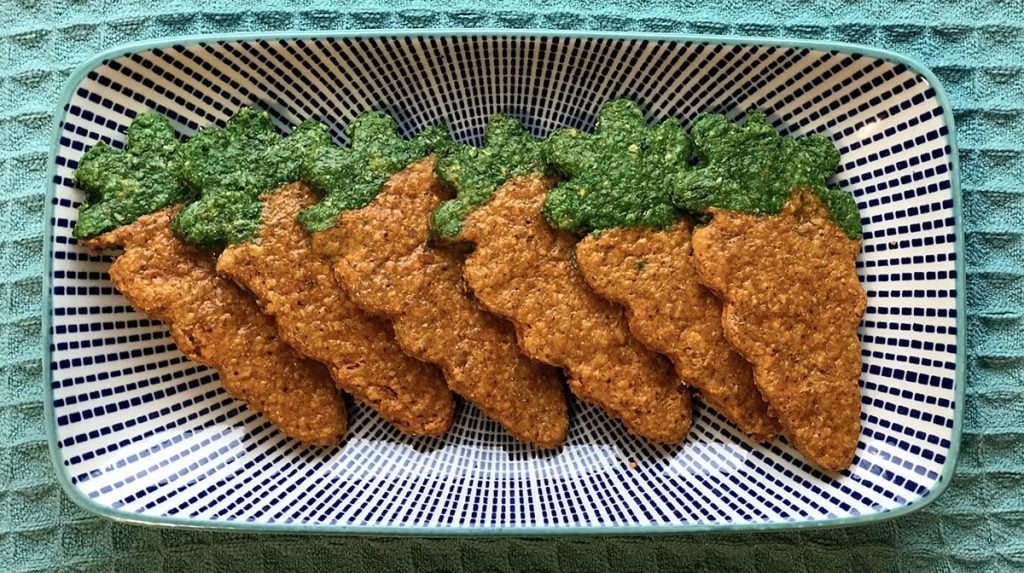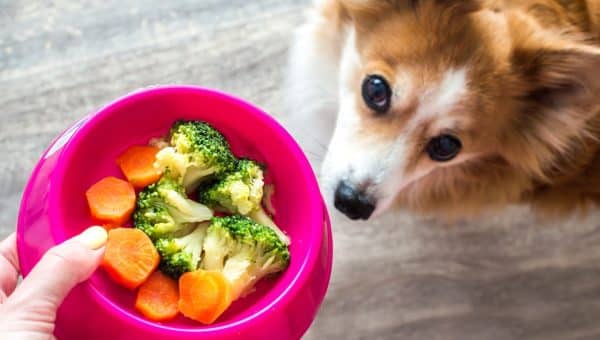We know fruits and vegetables are packed with healthy vitamins and minerals. We know they perform wonders for the body. But do they offer the same benefits to our dogs?
Certain fruits and vegetables are definitely more suitable for dogs than others. (And some should absolutely be avoided—a few of those are mentioned here.) Research is mixed as to whether your dog needsa veggies and fruits, but some promising studies have shown that supplementing with certain vegetables, in particular, is good for your dog. This study showed a reduced rate of cancer in Scottish terriers that ate leafy greens three times a week, for instance.
We’ve put together a list of the best, most nutritious and suitable fruits and veggies for your pet. These can help with stomach upset, freshen the breath, boost immune and heart health, and tidy up the digestive tract.
Tips for Serving Fruits and Veggies to Your Dog
Serve fruits and vegetables only periodically, and in small quantities. In general, they should be a small portion of a dog’s diet.
- Watch sugar content: Fruits contain a lot of sugar, so keep quantities small.
- High fiber: Fiber is a good thing, and most fruits and vegetables are also high in fiber. However, too much can lead to diarrhea or vomiting.
- Check for reactions: Always keep an eye on your dog after introducing a new ingredient into her diet.
1. Apples
Apples contain antioxidants, dietary fiber, vitamin A, and vitamin C. Some dogs will enjoy their crunchy texture (almost like a chew toy!). They help freshen doggy breath and improve dental hygiene. With their fibrous insides, they’re a bit like all-natural dental-bones. But be sure to wash and slice apples before serving, and remove the core and seeds, which contain trace amounts of cyanide. You can also add a bit of peanut butter if your dog is reluctant to give the fruit a try at first.
Try our apple pie bites dog treat recipe.
2. Bananas
Like apples, bananas are a great source of dietary fiber, potassium, magnesium, and vitamins B6 and C. Be sure to peel bananas before serving. You can slice and serve them as treats or mash them and add them to your dog’s food. No more than half a banana is suitable for a medium-sized dog. You can also mash a banana, squish it inside a Kong toy, and freeze it before sharing to give your dog a tasty project on a hot a summer day.
You can use banana in place of applesauce or pumpkin in any of our recipes, but we have recipes for banana ice cream and crunchy banana cookies too.
3. Blueberries
Blueberries are a good source of dietary fiber, antioxidants, and vitamin C, which boost a dog’s digestive and immune systems, and help maintain healthy brain function. Share just two or three frozen or fresh blueberries periodically.
Try our recipe for blueberry muffins for dogs.
4. Brussels Sprouts
Brussels sprouts are rich in fiber and antioxidants, which help reduce inflammation in the body and improve overall blood circulation. They’re also loaded with vitamins. Brussels sprouts are good for cleaning out the colon and improving digestive health, but they also make dogs a bit gassy. Serve only one to three sprouts at a time, depending on the size of your dog. Make sure to remove the hard, nubby stem and slice each sprout in half. Cook plain before serving.
5. Cantaloupe
Cantaloupe contains vitamins A and C, beta-carotene, folic acid, antioxidants, and dietary fiber. All of these good things, taken together, benefit your dog’s eyes and fur, decrease inflammation in the body, and improve digestive health. Be sure to remove the rind and seeds before sharing and offer only a few bites of cantaloupe periodically.
Try our recipe for two-ingredient cantaloupe ice cream for dogs (and humans) or our recipe for dehydrated cantaloupe chews.
6. Carrots
Carrots are a healthy snack for humans and dogs, and a great substitute for traditional dog treats. They’re low in calories, high in fibre, and an excellent source of vitamin A and potassium. You can share plain, cooked carrots by adding them to your dog’s usual bowl, or share raw carrots periodically as a snack. Make sure the carrot stick is cut into manageable chunks to prevent choking. Frozen carrots (sliced or diced) can help teething puppies soothe their gums.
Try our recipe for carrot cookies for dogs.
7. Green Beans
Green beans are an excellent source of fibre, magnesium, vitamin A, vitamin C, and vitamin K. The fibre in green beans will help your dog feel full longer without piling on unnecessary calories. Dogs will enjoy eating cooked or fresh (not canned) green beans as a snack or treat, added to wet food, or as part of a homemade meal containing other healthy ingredients
Try our recipe for turkey meatballs featuring green beans or dehydrated veggie snacks.
8. Pumpkin

Flickr / @PIVISO
Pumpkin is high in fibre and does wonders for the digestive system. It’s rich in fatty acids, which are good for the skin and fur. Pumpkin also contains beta-carotene, antioxidants, and tons of healthy minerals. Be sure to serve canned pumpkin (not raw, sweetened, or spiced). Add a tablespoon to your dog’s usual meal. You can freeze excess pumpkin in ice trays, then thaw and serve as needed.
Try our recipe for peanut butter pumpkin softies.
9. Spinach
This leafy green vegetable is loaded with nutritional benefits for humans and dogs. Spinach contains vitamins A, B, C, and K, as well as calcium, iron, fibre, manganese, folate, and potassium. It boosts the immune system, heart health, energy levels, and vitality. Offer your dog blandly cooked spinach (no butter, onions, garlic, salt, or pepper), and be sure to chop the leaves well before sharing. It also helps to incorporate spinach into your dog’s usual meal (rather than serving on its own) so it’s easier to chew and swallow.
Try our recipe for power puff egg bites with spinach.
10. Sweet Potatoes
Sweet potatoes are high in fibre, and they contain vitamin B6, vitamin C, several beneficial minerals, and beta-carotene, which is thought to help protect against cancer and heart disease. Add a teaspoon (for small dogs) to a tablespoon (for large dogs) of steamed or boiled sweet potatoes to your pet’s usual bowl of food. Make sure to avoid candied yams, which are high in sugar.
Give our sweet potato holiday side dish as a tasty meal mix in for your dog.
11. Watermelon
Watermelon is like a giant health-bomb! It’s low in calories and packed with nutrients, like potassium, beta-carotene, and magnesium. It also contains vitamins A, B6, and C, and helps boost immune system health. Be sure to remove the watermelon’s seeds before sharing and don’t offer your dog the rind, which is difficult to chew and digest.
Not sure how to get more vegetables into your dog’s diet? You can dehydrate them to use as cheap and healthy treats.








